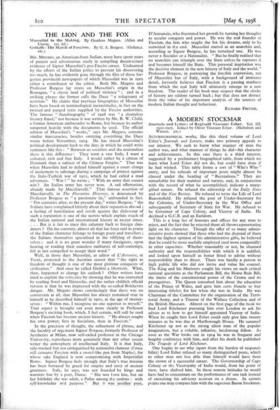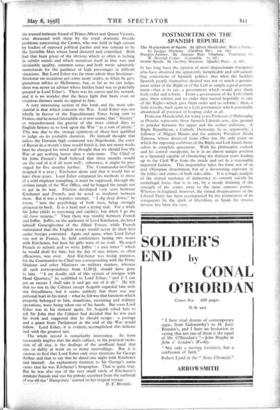A MODERN STOCKMAR
AUTOBIOGRAPHIC.AL works, like this third volume of Lord Esher's Journals and Letters, make two primary appeals to our interest. We seek to know what manner of man the author was, and what manner of things he did—his character and achievements. In this case there is a third interest, suggested by a preliminary biographical table, from which we learn what Lord Esher did not do, but could have done if he had wished. This table forms a sort of" Who's Who" entry, and his refusals of important posts might almost be classed under the heading of "Recreations." They are remarkable for their number and variety, and, in conjunction with the record of what he accomplished, indicate a many- gifted nature. He refused the editorship of the Daily News and of the New Review. He refused to write the Life of Lord Beaconsfield. He refused the post of Under-Secretary for the Colonies, of Under-Secretary in the War Office and subsequently of Secretary of State for War. He refused to be Governor of Cape Colony, and Viceroy of India. He declined a G.C.B. and an Earldom.
This is a long list of honours and offices for any man to reject, and the fact that he rejected them all throws a penetrating light on his character. Though the offer of so many admin- istrative posts showed that those who had the disposal of them had the highest opinion of his administrative gifts, he believed that he could be more usefully employed (and more congenially) in other capacities. Whether reasonably or not, he shunned authority and the responsibilities with which it is saddled, and looked upon himself as better fitted to advise without responsibility than to direct. There was hardly a person in high public life who did not invite and value his counsel. The King and his Ministers sought his views on such critical national questions as the Parliament Bill, the Home Rule Bill, the limits of the constitutional power of the Crown and its prerogatives. The Queen consulted him about the education of the Prince of Wales, and gave him carte blanche to buy interesting bibelots for her when she was in India. He was Chairman of the Committee for the organisation of the Terri- torial Army, and a Trustee of the Wallace Collection and of the British Museum. Almost on the first page of the book we find Lord Kitchener pursuing him over London to ask his advice as to how to get himself appointed Viceroy of India. When he caught him Lord Esher could only give him twenty minutes as he was due at Marlborough House. He summed Kitchener up not as the strong silent man of the popular imagination, but a voluble, talkative, headstrong fellow. As soon as the War broke out in 1914 he was in frequent and lengthy conference with him, and after his death he published The Tragedy of Lord Kitchener.
One begins to see why (apart from the burden of responsi- bility) Lord Esher refused so many distinguished posts, which to other men not less able than himself would have been the crown of a successful career. The Governorship of Cape Colony or th.-: Viceroyalty of India would, from his point of view, have shelved him. In those remote latitudes he would have had to concentrate on the performance of one task instead of exercising his advisory acumen on a dozen. In certain points one may compare him with the sagacious Baron Stockmar, the trusted intimate friend of Prince Albert and Queen Victoria, who discussed with them by the royal domestic fireside problems concerning the Crown, who was held in high esteem by leaders of opposed political parties and was content to be the Invisible Man whose hand directed and controlled. Both had that keen grasp of the obvious which so often is lacking in subtler minds and which manifests itself in that rare and invaluable quality, common sense, and both wrote admirable memoranda for the guidance of high personages in difficult situations. But Lord Esher was far more adroit than Stockmar : Stoclunar on occasions got some nasty snubs, as when he gave gratuitous advice to Melbourne, but, as far as we can judge, there was never an adviser whose hidden hand was so gratefully grasped as Lord Esher's. There was his career and his reward, and it is no wonder that the fierce light that beats even on vicariouS thrones made no appeal to him.
A very interesting section of this book and the most sub- stantial is that which concerns the War. Lord Esher was not wholly in favour of the Expeditionary Force being sent to France, and he noted (incredible as it now seems) that" Society" so misunderstood the gravity of the most critical days in English history as to look upon the War "as a sort of picnic." This was due to the strange optimism of those best qualified to judge on its probable duration. He himself thought that unless the German high command was Napoleonic, the entry of Russia in a month's time would finish it, but not many weeks later he changed his mind and thought that we should lose the War or get nothing better than a stale-mate. The Chief of Sir John French's Staff believed that three months would see the end of it if all went well ; otherwise, it might be pro- onged for. five months further. The Commander-in-Chief assigned it a year ; Kitchener alone said that it would last at least three years. Lord Esher compared his methods to those of a wild elephant trampling, it must be supposed, through the civilian jungle of the War Office, and he begged the jungle not to get in its way. Friction developed very soon between Kitchener and French, and he acted as mediator between them. But it was a hopeless attempt. "I dig deep down," he wrote, "into the psychology of both men, being strongly attracted to both. It is a hard and a trying task. For a while Sir John yields to reasoning and cajolery, but when I go the old furor returns." Then there was trouble between French and Joffre. Joffre, on the authority of Lord Kitchener, declared himself Generqlissimo of the Allied Forces, while French maintained that the English troops would never do their best under foreign command. Again and again, when Lord Esher was not in France, he held conferences lasting two hours with Kitchener, but here his gifts were of no avail. He urged French to submit and to write Joffre "a nice letter" which he would draft for him, but the day of nice letters, so often efficacious, was over. And Kitchener was losing patience, for the Commander-in-Chief was corresponding with the Prime Minister and other Ministers on military matters, whereas all such correspondence from G.H.Q. should have gone to him. "I am deadly sick of this system of intrigue with Head - Quarters," he scribbled to Lord Esher, "and if I can get an excuse I shall take it and get out of it all." He felt that no one in the Cabinet except Asquith regarded him with any friendliness, but it seems unlikely that there was any personal hurt in his -mind : what he felt was that functions which properly belonged to him, munitions, recruiting and military operations; were being taken out of his hands. But soon Lord Esher was in his element again, for Asquith asked him to tell Sir John that the Cabinet had decided that he was past his work- and suggested that he -should -resign : a peerage and a grant from Parliament at the end of the War would follow. Lord Esher, it is evident,- accomplished this delicate task with the greatest tact.
The whole record is remarkably interesting. Its form necessarily implies that the main subject, to the practical exclu- sion of all else, is the dealings of the unofficial hand that was so deftly at work on so many tmravellings. But it is curious to find that Lord Esher only once mentions Sir George Arthur and that to say that he dined one night with Kitchener and hiniself. An explanatory- footnote to Sir George's name states that he was ICitchener's biographer. That is quite true. But he was also one of the very small circle of Kitchener's intimate friends and was his private secretary from the outbreak Of war till the' Hampshire 'started on her tragical voyage. - E. F. BEN§Olst.



































































 Previous page
Previous page